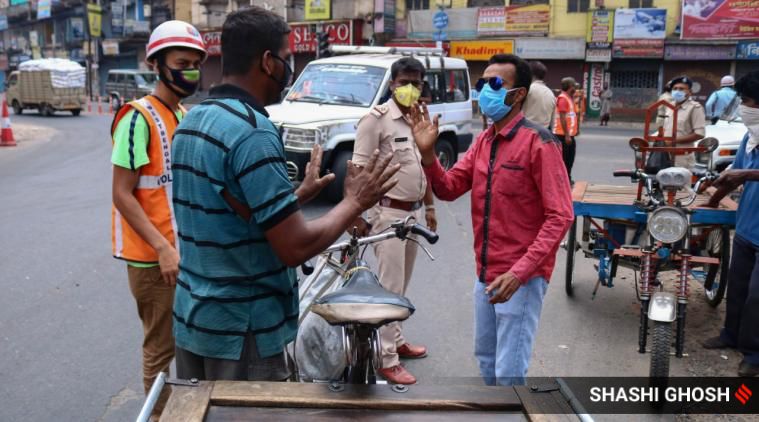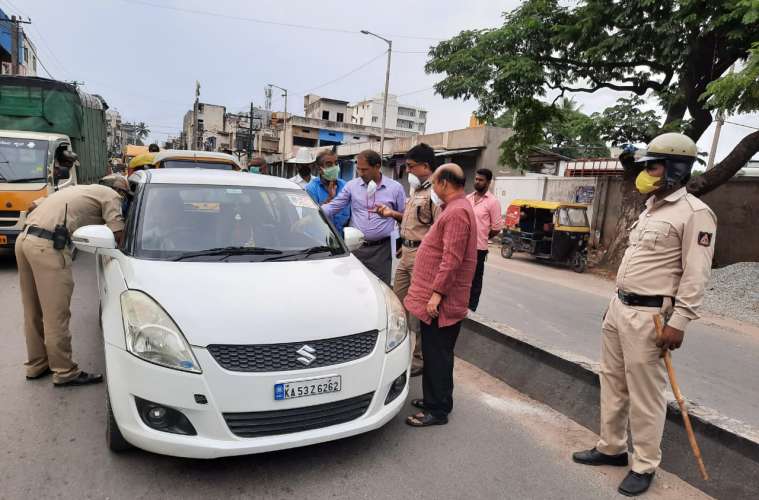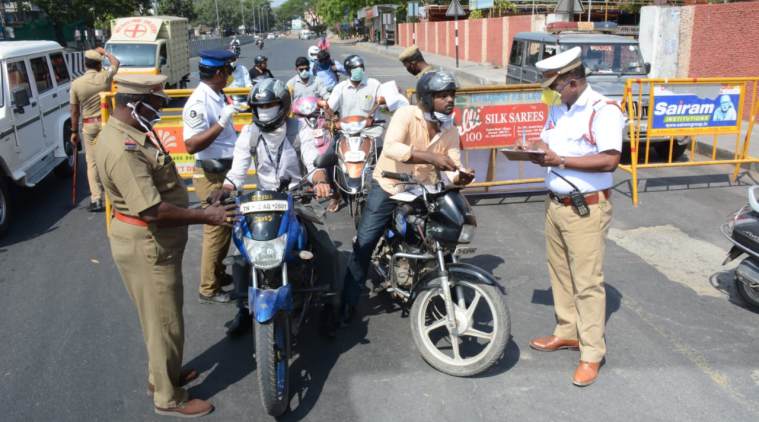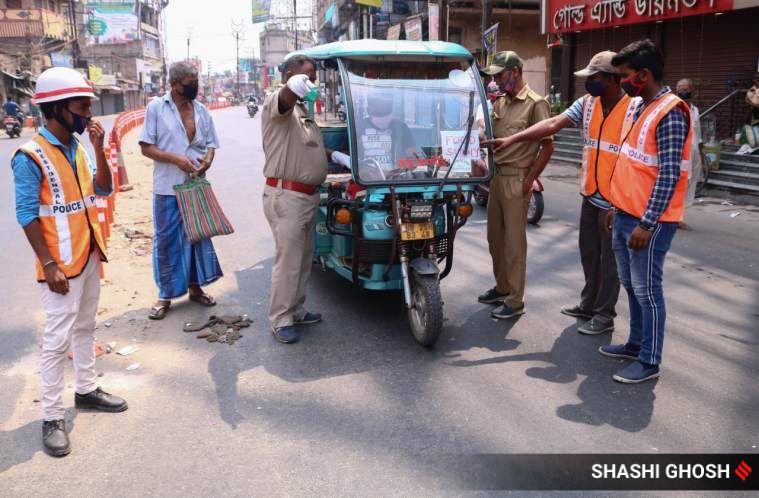 In Kolkata, it is the young demographic, which is upto tricks. (Express photo: Shashi Ghosh)
In Kolkata, it is the young demographic, which is upto tricks. (Express photo: Shashi Ghosh)
Most Monday mornings, much of Hyderabad’s Inner Ring Road is choked with traffic. On this one, however, all is quiet, with only a smattering of vehicles. As the April sun shines down fiercely, a harrowed policeman tries to pacify a man on a two-wheeler by the side of the road.
“I have to travel to the bank every day. Will I get an e-challan?” the man anxiously asks. On the front of his scooter is a sticker with the name of the private bank he is employed by.
The cop wipes a bead of sweat from his forehead, adjusts his face mask and glasses, and replies: “If you get one, we will see what to do about it.”
While e-challans are an old way of pinning traffic violators in Telangana, the system has come in handy during the lockdown, too. As per a recent government order, the Telangana Police have been issuing such challans to motorists if their vehicles are found more than 3 km away from their residences.
“Upon checking we come across two-wheelers with pending challans worth Rs 60,000! The bike would not get him more than Rs 10,000 if sold,” the policeman jokes, after the man is allowed to pass.
The last three weeks — ever since the nationwide lockdown was imposed by Prime Minister Narendra Modi — have been a lesson in human psychology for the 50-year-old policeman, who is one among a contingent of ten, manning a check-point barely meters away from the Chief Minister’s camp office in Begumpet.
“One thing I have learned over these days is that come what may, people have perfect excuses to be out on the streets. On hearing them, you don’t even know whether to question them,” he says, breaking into a mild rant.
The unprecedented COVID-19 pandemic has put the world in a fix. A part of this story plays out at the thousands of police checkposts, where the state and the public meet everyday in a never-ending cycle of requests and negotiations.
The young and the restless
In some parts of the country, authorities feel violations have significantly reduced as the lockdown progresses. Bhadrappa, a police constable in Bengaluru’s Hosur road check post, says most people now have genuine reasons to step out: emergencies like going to hospitals or visiting sick people. “Initially when the lockdown began, the young were out and about on their two-wheelers. This has come down,” he says.
 In Bengaluru, too, where main roads are barricaded, people take to its leafy lanes. This has led the police to deploy their mobile vehicular patrol units, known as ‘Hoysala’, to check movement, every hour even at night. (Express photo: Darshan Devaiah)
In Bengaluru, too, where main roads are barricaded, people take to its leafy lanes. This has led the police to deploy their mobile vehicular patrol units, known as ‘Hoysala’, to check movement, every hour even at night. (Express photo: Darshan Devaiah)
In Kolkata too, it is the young demographic, which is upto tricks. “We have seen that mostly young people — college students and young adults — are out on the road. They claim they want to buy medicines and show us fake receipts when asked to produce supporting documents,” says a Kolkata Police officer.
“They are bored at home and want to step out. Hence, they go out on joyrides,” adds the officer. The Kolkata Police also claims to have caught many young adults gathering around marketplaces for addas.
Also read | Lockdown Diary Day 20 update
In Chennai, Villivakkam Police Inspector S Rajeesh Babu, calls the 18-25 age group “habitual offenders”. “Since there is a strict restriction on main roads, these youngsters try to roam around in the streets near their houses,” says Babu, “When we ask them, they say they have come out to buy milk or to get a haircut or some other silly reason.”
In Tripura, a couple of people on the streets were found producing false or outdated medical prescriptions to justify their visit outdoors. Some claimed to be “en route to market” 20 km away from their residence.
 In Chennai, Villivakkam Police Inspector S Rajeesh Babu, calls the 18-25 age group “habitual offenders”. (Express photo: Janardhan Koushik)
In Chennai, Villivakkam Police Inspector S Rajeesh Babu, calls the 18-25 age group “habitual offenders”. (Express photo: Janardhan Koushik)
In Bengaluru, too, where main roads are barricaded, people take to its leafy lanes. This has led the police to deploy their mobile vehicular patrol units, known as ‘Hoysala’, to check movement, every hour even at night.
“They do not understand the seriousness of the pandemic,” says Babu in Chennai. Around two weeks back, the cop had donned the now-famous ‘Coronavirus-themed helmet’, warning city residents about the dangers of violating lockdown.
“Before that, I had seen a lady walking around the market without a mask on. I asked her what she will do if she is affected by Corona. She replied ‘What is Corona sir?’” recalls Babu, “That is when I realised I needed to do something out-of-the-box to raise awareness about the pandemic.”
A police official in Assam says there is a thin line between a ‘lockdown’ and a ‘curfew’. “If it is a curfew, people cannot step out. But here, essentials are open so people can step out too,” says the official, “In situations like this, there is bound to be confusion.”
‘The honest ones don’t run away’
On Monday morning, Praveen, an IT employee with his 70-year-old father, was stopped by the police at a checkpost Bengaluru’s BTM layout. “I stay in Sarjapur and I have to take my father to the hospital for dialysis in Jayanagara,” he says. The BTM layout is the third checkpoint the duo have been stopped at. But Praveen does not mind. “I show the appointment receipt booked online and the police let us through, there are no issues,” he says.
In Assam’s Dhubri town, policemen stand guard at check-posts in two shifts: 6am to 2 pm and 2pm to 10pm . “And at night, we patrol,” says Trinanayan Bhuyan, Deputy Superintendent of Police (HQ) Dhubri.
 In some parts of the country, authorities feel violations have significantly reduced as the lockdown progresses. (Express photo: Shashi Ghosh)
In some parts of the country, authorities feel violations have significantly reduced as the lockdown progresses. (Express photo: Shashi Ghosh)
In the last few weeks, Bhuyan says he has learnt how to gauge the situation by the way people react. “Sometimes they drive away the moment they see the check-post,” he says, “The honest ones usually don’t run away, except when they get nervous.”
It is often frustrating, but Bhuyan remembers one incident where he couldn’t stop laughing, despite himself. “We were patrolling and a violator saw us — he ran so fast that suddenly he disappeared,” says Bhuyan.
The man had actually climbed up a betel nut tree. “He thought he was safe because he was up there, but little did he know we could see his dangling legs,” recalls the policeman, with a laugh.
(With inputs from Neha Banka in Kolkata, Debraj Deb in Agartala and Tora Agarwala in Guwahati)